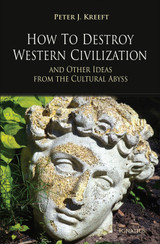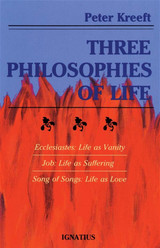Product Overview
In 2019, Peter Kreeft published Socrates' Children, a four-volume series on the hundred greatest philosophers of all time, spanning from ancient Greece to contemporary Germany. But he made a terrible mistake: he somehow left out women, and with this, he overlooked the greatest mind of them all.
He forgot her—a mysterious housewife from a desert village—because he had forgotten what "philosophy" means. "Philosophy is not the cultivation of cleverness," Kreeft explains, "or the sophistications of scholarship, or the analysis of analysis, or the refutation of refutations, or the deconstruction of deconstructions." No, "philosophy is a romance, a love affair—the love of wisdom."
This book is a one-of-a-kind study on Mary of Nazareth, the mother of Jesus. If Jesus Christ is wisdom incarnate, and if Mary loved Him more than anyone else ever did, then it holds that Mary is the greatest philosopher, the greatest wisdom-lover. With precision and humor, Kreeft not only unpacks the thought and spirit of Mary as we know her through Scripture and Church doctrine, but offers a heartfelt crash course in the basics of philosophy—methodology, epistemology, logic, metaphysics, cosmology, ethics, politics, aesthetics, and more—all through the lens of the Mother of God.
Fans of Kreeft will find here another fine example of his characteristic freshness, creativity, depth, and readability. But above all, those who are curious about the mother of Jesus, whether they are new to Christian faith or simply hoping to discover it anew, will likely find themselves swept up in the tide of Mary's wise love for God.
Editorial Reviews
"Here is a book about two handmaids: the handmaid of theology and the handmaid of the Lord. Kreeft deftly reframes both, arguing that Mary's fiat fulfills the project of philosophy, a project that is not theoretical, but personal—not an abstract discipline, but an embodied devotion. Amidst saccharine Marian reflections and dry analytical tomes, this surprising little book stands out like a bright star."
— Abigail Favale, Ph.D., Dean, College of Humanities; Professor of English, George Fox University
"This meditation on Mary, Seat of Wisdom, wisely points to her as the model of philosophers. Through reflections on her life as revealed in Scripture, Church teaching, and major Marian apparitions, Kreeft shows her to be a living and comprehensive lesson in the greatest truths of philosophy, and the best antidote to modern philosophy and the inhuman culture built upon it."
— Michael Augros, Ph.D., Author, Who Designed the Designer? and The Immortal in You
"Sadly, this book is a rarity among contemporary philosophical works—for it is at once logical and lyrical. What makes it even more rare is that this book of philosophy can move you to both prayer and love. You'll want to read this book more than once. Thank you, Dr. Kreeft!"
— Fr. Robert McTeigue, S.J., Author, Real Philosophy for Real People; Host, The Catholic Current, Station of the Cross Catholic Media Network











